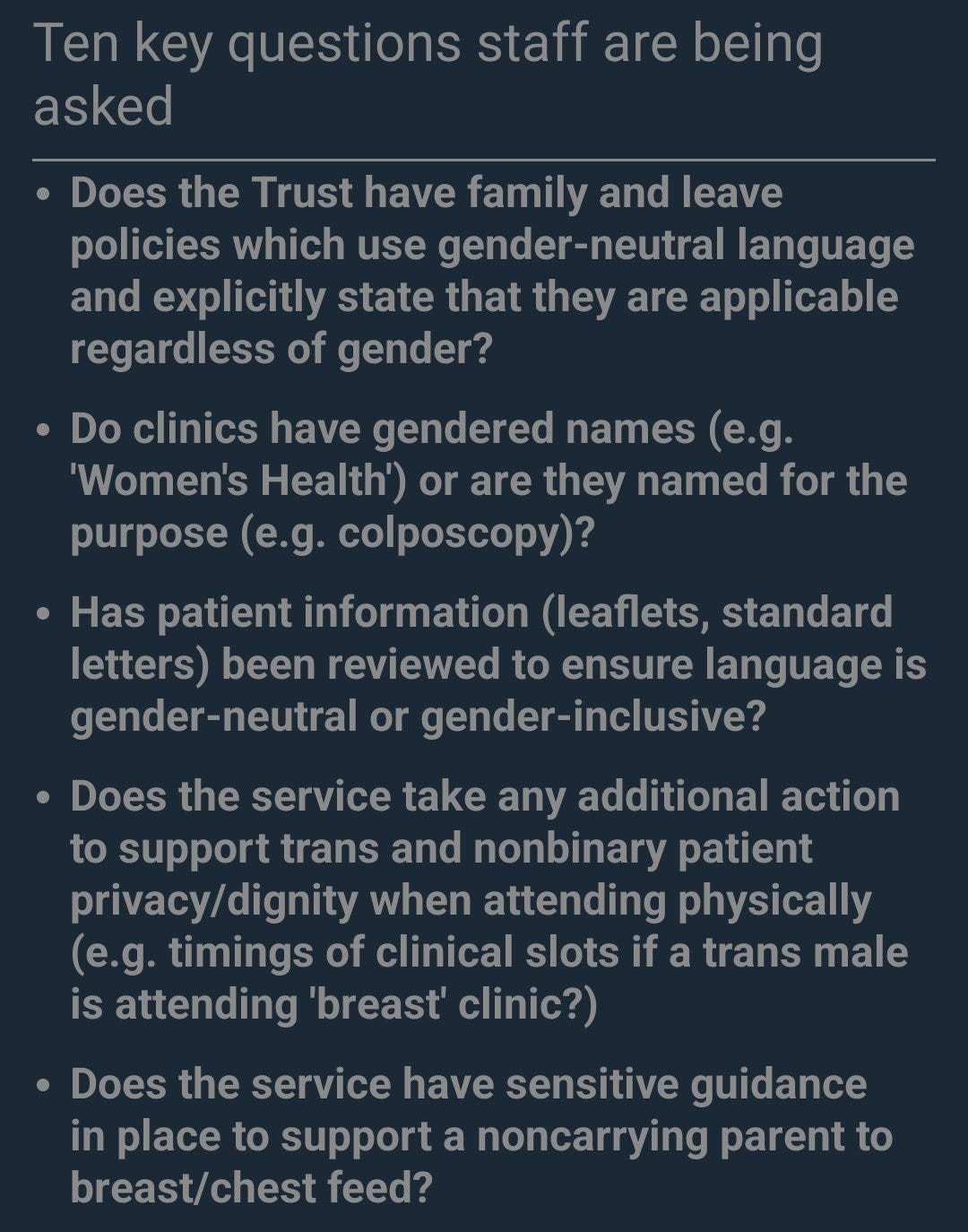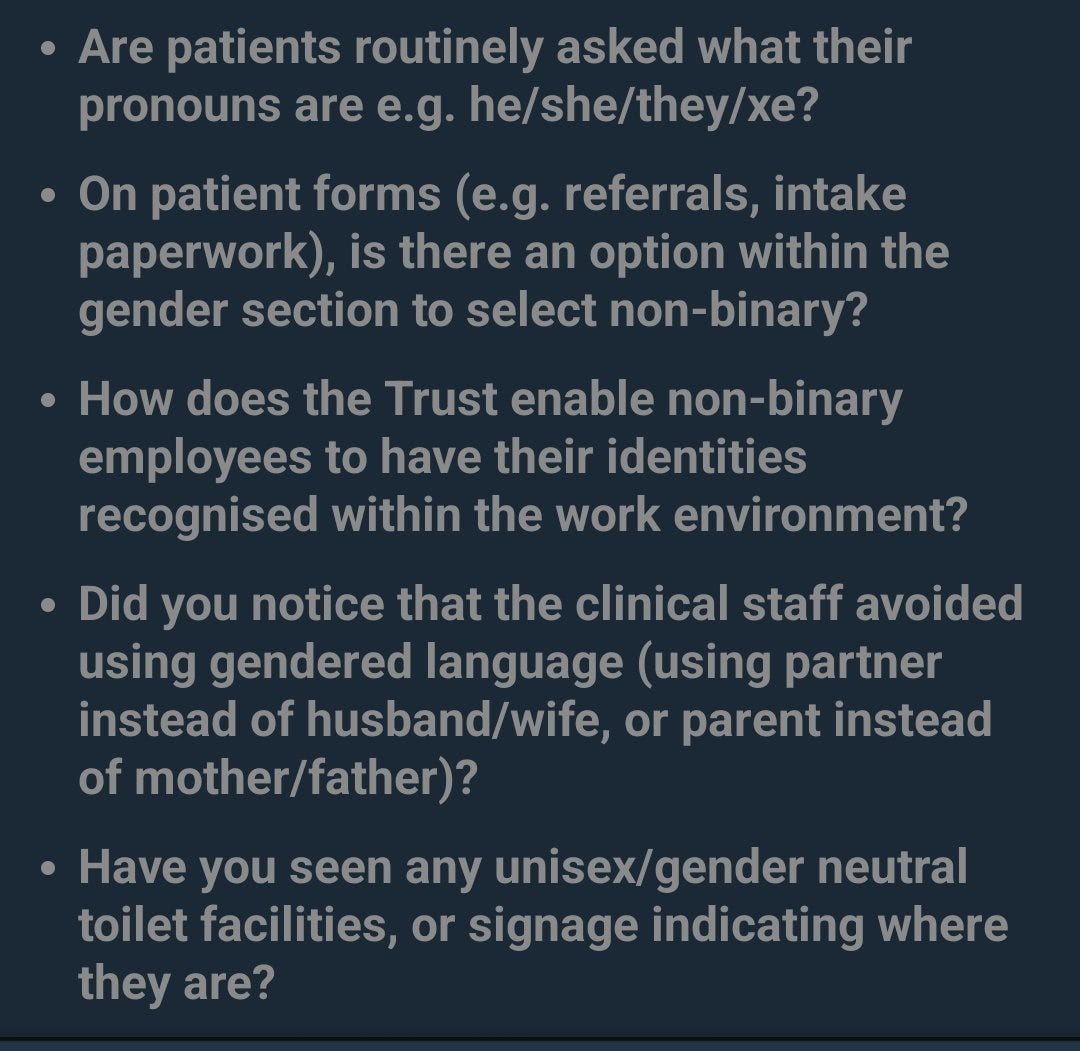The Word is Woman #2
Documenting the erasure of women from language and life.
Welcome to the second issue of a new section of The Mule, The Word is Woman, where I document examples of the erasure of women from both language and public life. Last week’s issue was read by over three thousand people, and has led to a huge influx of new subscribers, both paid and unpaid. Thank you for being here! And thanks to those of you who have sent me examples to share in this week’s newsletter. It’s appreciated!
For the past two years, ever since I spoke out about language changes in maternity such as ‘birthing people’, I have been sent hundreds of examples of convolutions of language in which the word woman is erased and replaced in the name of so-called ‘inclusivity’. Uterus owners, menstruators, non-men, bleeders, birthers, and even bodies with vaginas…the list of names we have been called and continue to be called is a seemingly endless catalogue of offence.
At the same time, we are seeing male people taking the place of women on sporting podiums and in public roles, and also being applauded as the ‘first woman’ to achieve a certain award or accomplishment, or the ‘best female’ or ‘woman of the year’ in their field.
For now, The Word is Woman will be sent out weekly, and I’ll review this as we go. If you’d rather not receive these emails, but want to stay subscribed to The Mule, you can adjust your settings at substack.com/settings. Any problems as we get this started, just let me know. And if you spot examples of erasure that you’d like to see highlighted, you can send them to me via email (either by replying to one of my substacks or at milli@millihill.co.uk), with the subject line, The Word is Woman.
The Word is Woman, like all my content, is paywalled after a week after which it is only for my paying members. You can subscribe and get this weekly round up, along with all my other content, access to the full archive, subscriber chats and commenting, all for the price of a chocolate bar a week. In doing so you’ll also be supporting me and enabling me to give more of my time to this work.
So here is this week’s The Word is Woman for the week ending 1st September 2023.
This week the idea of ‘women being erased’ has been in the mainstream media, with coverage of the NHS Rainbow Badge Scheme. The scheme, the first phase of this was a simple badge for health professionals to wear, has now moved into a second phase in which the 77 hospital trusts who have signed up will gain points and awards for using terms like ‘client’ instead of ‘maternity patient’, and ‘colposcopy’ in place of ‘women’s health’.
The Mail report (link is here) features 10 key questions that staff in the scheme will be asked.
I won’t spend too long on this story as it’s had plenty of media coverage, but what I will say is that one of the partners for the scheme is the LGBT Foundation, who were also behind a piece of research known as ITEMS (Improving Trans and Non-binary Experiences of Maternity Services). ITEMS has since been widely quoted in maternity, used as the basis for a range of recommendations, and been unchallenged - until now. This week four academics published a peer-reviewed critique of ITEMS in the British Journal of Midwifery. I’ll be writing a full post about their findings next week, but for now, you can read it here.
This week I came across the NHS Blood and Transplant (NHSBT) policies for menopause and ‘becoming a parent’ - or ‘maternity’ as it used to be called before it seems they took advice from Stonewall - NHSBT is now placed number 93 in the Stonewall top 100 employers 2023.
The Parents Policy mentions the word mother only twice, on one occasion in reference to surrogacy.
The menopause policy page makes no reference to women at all and states that, “Most people will experience menopausal symptoms.”
Another story that caught my eye this week came via fellow substacker
, whose work many of you will be familiar with. Her latest newsletter revealed the somewhat amazing fact that the absorbency of period products have never been tested with actual blood, let alone with menses! Until now, apparently, it’s only been done with saline solution. Anyway, excited to read more, I clicked through to the groundbreaking piece of research that finally tested how tampons respond to blood, and guess what? Heavy menstrual bleeding doesn’t affect women, apparently, it affects ‘menstruating individuals’.So, even as researchers address huge gaps in data in women’s health, overlooked and sidelined for decades, they fail to see the irony of not naming us as they do so.
Another person got in touch this week to let me know about the fifth edition (2018) of the classic guide for birth supporters, The Birth Partner by Penny Simkin.
This edition replaces most instances of the word woman with ‘pregnant person’, or ‘birthing person’. Here is the example they sent me, you can see more on the Amazon preview, if you are curious.
This instagram post uses the word ‘birthers’ to replace ‘women’. Link here.


Here’s a historic one from 2020 that someone kindly reminded me of. Link here.
And finally…, we end this week’s The Word is Woman with Dominic Mark Carter, a male person convicted on three counts of making indecent images of children. Since conviction, Dominic has changed his name to Sophie Louise and started wearing a lot of pink. As a result, press reports (following IPSO guidelines - see here for Sex Matters response) have reported on Dominic as ‘She’, for example, “She must now be registered as a sex offender”, and that “she” wrestled with police.
It seems that there are still people out there who we are all obliged to call women.
Until next time, thanks for reading The Word is Woman.
The Mule is a reader-supported publication and I would value your support. To make sure you never miss a post, please consider becoming a free or paid subscriber. Paid subscribers support me to spend more time documenting these language changes. Thank you.













I have no words ! WOW ! Thank you for this. Its so painful to see how simply a whole category is erased -- the struggle and the fight continues-- unbelievable. And to erase the word Mother-- first it was the Great Mother-- now this.